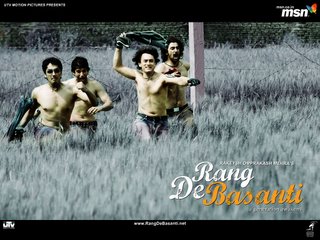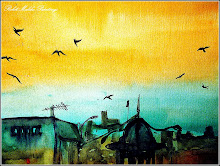This is a copy of a forwarded message. I found if worth a read and therefor I have put it here. I give full credit to the author. Kudos !
Imagining the Google Future:
Top experts help us plot four scenarios that show where the company's geniuses may be leading it--and, perhaps, all of us. By Chris Taylor February 1, 2006: 6:16 PM EST (Business 2.0) - We all know that the company Sergey Brin and Larry Page founded a mere eight years ago is one of the new century's most cunning enterprises.
If there were any lingering doubts, 2005 erased them. Google's sales jumped an estimated 50 percent to $6 billion, its profits tripled to a projected $1.6 billion, and Wall Street answered with an unprecedented vote of confidence: a $120 billion market cap, a share price soaring above $400, and a price/earnings ratio close to 70. That's a huge bet on future growth that seems unthinkable during the postbubble period. But in Google's case, the exuberance is rational. That's because Brin, Page, and CEO Eric Schmidt cornered online advertising: They've made it precision-targeted and dirt cheap.
U.S. companies still devote more ad dollars to the Yellow Pages than to the Internet (which accounts for less than 5 percent of overall ad spending). Yet Americans now spend more than 30 percent of their media-consuming time surfing the Web. When the ad dollars catch up to the trend, a mountain of cash awaits, and Google is positioned like no one else to scoop it up. Even if Google has to share that payday with rivals like Microsoft and Yahoo, the company has an edge, with storage space and sheer processing power--an estimated 150,000 servers and counting--that will enable it to do just about anything it wants with the Web. And boy, does this company want. It signed up about eight new hires per day in 2005--a lot of them from Microsoft, many among the smartest people on the planet at what they do.
Google is on track to spend more than $500 million on research and development in 2006, and last year it launched more free products in beta than in any previous year (see opposite page). Name any long-term technology bet you can think of--genome-tailored drugs, artificial intelligence, the space elevator--and chances are, there's a team in the Googleplex working on an application. Which raises the most widely debated question in business: What kind of company will Google become in the coming decades? Will it succumb to hubris and flame out like so many of its predecessors? Or will it grow into an omnipresent, omnipotent force--not just on Wall Street or the Web, but in society?
We put the question to scientists, consultants, former Google employees, and tech visionaries like Ray Kurzweil and Stephen Wolfram. They responded with well-argued, richly detailed, and sometimes scary visions of a Google future. On the following pages, we've compiled four very different scenarios for the company. Each details an extreme, but plausible, outcome. In three of them, Google attains monopolistic power, lording over the media, the Internet, and scientific development itself. In the fourth, Google withers and dies. That may seem unthinkable now, but nobody is immune to arrogant missteps. Not even today's smartest business minds. --Additional reporting by Paul Kaihla andErick Schonfeld
Scenario 1 (Circa 2025):
Google Is The Media Google TV, Google Mobile and the rise of e-paper create the perfect storm. Some say it began with the launch of Google News, the company's first media aggregation site, in 2002. Others point to Google Book Search, completed in 2007 despite cries of foul play from the publishing industry.[1]
But those were just trial runs. Google took its first real step toward media dominance in 2008, when it bought an obscure cable network for $3 billion and transformed it into Google TV.[2]
The library of video content the company had been archiving for years was now searchable via remote control. Viewers could choose any show they wanted from the history of TV; all they had to do in return was sit through just one commercial before each show, and then vote with their remotes on how relevant they found the ad. Since viewers had to enter their Google IDs--the same ones they used for Gmail and other premium services--the company had already compiled a rich history of their searching and surfing habits.[3]
If you spent a lot of time looking at cars on eBay, for example, you'd be shown automotive ads the next time you watched Google TV. Between 70 and 80 percent of the revenue from each ad went to the content provider, just as it had on the Web. Google TV was an instant hit; advertisers, copyright owners, and cable customers all clamored for more. (One of the first casualties was a company called TiVo, which offered a hard-disc TV-recording service that Google's vast remote archive now made redundant.) Searches, ads, and Google TV schedules became more relevant every month. Consumers loved it. Google Mobile followed in 2009, delivering the same service to cell phones for free. Then the dam broke in 2011, when E Ink and Siemens began mass-manufacturing electronic paper.[4]
By 2018 the cost of e-paper had fallen close to that of the real thing, and Google began delivering all forms of media wirelessly to our e-papers, sheets hung on living room walls, and thin phones. For a while, media companies were happy with the generous cut they received from Google's skyrocketing ad revenues. But a new generation of content creators was growing up--one that did not see why a story should be printed in the New York Times or a movie distributed by Paramount if it was all going to end up on Google anyway.[5]
So the company offered a very public guarantee to all writers and artists that their works would not be edited in any way by Google (but added that consumers would be allowed to edit and remix them any way they wanted). In 2020 two Google-based writers won Pulitzer Prizes for reporting and fiction, Google-sponsored bands swept the Grammys, and a Google director walked away with the Oscar for best picture. Almost overnight, New York and Los Angeles had lost their footholds in the media universe. For talent--and fund-raising presidential candidates--Mountain View was the new place to be.
1) Litigation continues over Google Book Search.
2) "The Next Frontier: Google Eyeing a Move Into TV's Territory," Advertising Age, Oct. 31, 2005.
3) "The Search," by John Battelle, 2005, and interview with the author.
4) E Ink demonstrated the first tablet-size e-paper display in October 2005.
5) Interview with Danny Sullivan, editor, SearchEngineWatch.
Scenario 2 (Circa 2015):
Google is the Internet Free wi-fi, a faster version of the Web, the Gbrowser, and the cube transform the technology landscape and our language. It's been a long time since "Google" referred solely to a company in Silicon Valley. Its lawyers were battling use of the verb "to google" as early as 2003.[1]
But during the past decade, especially among the generation born after the millennium, the word has become interchangeable with "Internet," "computer," and "phone call." As in "Did you see that movie on google?," "Mind if I borrow your google?," and "Give me a google later in the week." This is no mere linguistic sloth. For most daily purposes, Google has become the technology platform, the communications network, and the Internet itself. The ubiquitous GoogleNet,[2] which blankets every major urban center in the world with free wireless access, cell-phone service, and targeted local advertising (starting with the successful San Francisco experiment of 2007), is only the most visible tip of the iceberg. Since the early 2000s, Google was buying up thousands of miles of previously unused fiber-optic cables--so-called dark fiber.
Then it began building myriad server farms, sending out billions of crawlers (automated programs that constantly browse the Web), and storing a fresh cache of all searchable information on the Web regularly--first every week, then every day, now every minute. The upshot was that it became far faster and easier to use Google's copy of the Web than the slowpoke Web itself. That's why Gbrowser, launched in 2008 (though the domain name was registered in 2004), took off: It had priority access to Google's version of the Web, unlike Microsoft's long-defunct Internet Explorer. Gbrowser also had scads of useful new features, like a commission-free micropayment system that superseded PayPal and (in conjunction with the virtual stores on Google Base) eventually drove once-powerful auction site eBay to the edge of bankruptcy. But the real genius of Gbrowser was to make the operating system irrelevant.[3]
Few people know or care today whether their computers run on Windows, Linux, or the Mac OS. It's simply part of the plumbing. Gbrowser handles just about everything you use a computer for, especially since Google adopted the Linux-based OpenOffice software and bundled it. The Justice Department's investigation into whether this made Google an illegal monopoly closed five years ago; it might have made more headway had the charges not been brought by Microsoft. Besides, few consumers are complaining. Nobody who remembers the horrific customer service and roaming charges of the old telecoms wants to give up their Google phone.
And 2010's Google Cube[4]--a tiny server that was distributed as freely and as widely as those CDs that AOL used to give away--became the one indispensable item in every home, running the TV, stereo, thermostat, and, for less adventurous cooks, even the oven. Among the younger generation, that has given rise to yet another new phrase:
Did you google dinner yet? 1) "To Google or Not to Google?," by Jason Kottke, kottke.org, Feb 26, 2003. 2) "Free Wi-Fi? Get Ready for GoogleNet," by Om Malik, Business 2.0, September 2005. 3) "The Google Browser," kottke.org, Aug. 24, 2004. 4) "The Google Box: Taking Over the World Four Ounces at a Time," by Robert X. Cringely, pbs.org/cringely/archive, Nov. 24, 2005.
Scenario 3 (Circa 2020): Google is Dead
The once-mighty search engine falls prey to privacy intrusion, optimizers and Microsoft. It was 15 years ago, when Google was in its ascendancy, that the seeds of its decline were sown. Not only did the company's 2005 deal with AOL introduce unpopular graphics-heavy banner ads onto what had formerly been a spartan search site, but that was the year that search engine optimizers, or SEOs, became a nuisance.[1]
Optimizers could, for a fee, tweak how important your website appeared to Google's PageRank engine by, say, hijacking the homepage of a major university and adding a link to your site. Despite a titanic struggle between Google's top technologists and the SEOs, within years many of the popular search results were clogged with irrelevant (and barely literate) commercial and porn sites. Meanwhile, virtually no one attempted to optimize results on Microsoft's MSN search, which had room to improve far beneath the SEOs' radar. When the quality of search slipped, so did Google's advertising business. The market for online ads turned out to be far softer than anyone--except Microsoft CEO Steve Ballmer--had predicted. Ballmer's smartest move, in 2008, was to buy a company called Snap.com. On Google, an advertiser paid anytime a user clicked on its ad. With Snap, the advertiser paid only if the user did something useful after clicking, like buying a product or filling out a survey.[2] Google soldiered on, continuing to tweak PageRank and doubling down on its long-term bets. The strategy might have worked, if not for a disgruntled, psychotic former employee who hacked the company intranet and began stalking women in the San Francisco Bay Area using information about their habits gleaned from their Google IDs.[3]
After the stalker was convicted in 2017, his victims sued Google. The case made headlines around the world. The next month, privacy advocates and civil liberties groups that had been complaining about Gmail's intrusive data gathering since 2004 [4] finally got a hearing--in front of Congress. Then the Justice Department opened twin-track Google investigations: one into antitrust violations, the other into older allegations of click fraud (in which unscrupulous competitors create programs to click on ads repeatedly and cost an advertiser more money).[5]
Overnight, Google's carefully crafted "do no evil" image had become irrevocably tarnished. Microsoft, itself the reviled monopolist before Google's ascendancy, was now ironically viewed as the more trustworthy company. MSN came to be seen as the better search engine, and Microsoft ads as the better bet for getting a message across. Attempts to open new lines of business in genome-tailored drugs and protein manufacturing could not save the Google brand.
This year the search engine firm, whose brain trust has long since fled, was acquired by Microsoft. The sale price of $25 per share was less than 5 percent of Google's historical high, yet was described by analysts as "extremely generous," given Google's crushing $50 billion in debt. Since most of the company's assets had already been auctioned off, many believe its Redmond rival was motivated by sheer historical schadenfreude. 1) "Hotwiring Your Search Engine," Newsweek, Dec. 19, 2005. 2) "Snap.com Plans to Combat Click Fraud," Associated Press online, July 19, 2005. 3) "Only in the Movies? A Privacy Scenario," John Battelle's Searchblog, Dec. 3, 2005. 4) April 2004 protest letter to Google from more than 30 leading privacy advocates, requesting that Gmail be shut down,
www.privacyrights.org/ar/GmailLetter.htm#letter. 5)
Click Defense lawsuit against Google in June 2005 over allegations of click fraud.
Scenario 4 (Circa 2105): Google is God Human consciousness gets stored, upgraded and networked. In the last years of the 21st century, humanity finally grasped the importance of They-Who-Were-Google. Yet as early as 2005, Their destiny was clear to any semi-hyperintelligent being. Technologists like Ray Kurzweil [1] suggested that Strong AI (an intelligent program capable of upgrading its own code) would emerge from Google-like data mining rather than a robotics lab. In 2005, historian George Dyson was told by an engineer in the Googleplex, "We are not scanning all these books to be read by people. We are scanning them to be read by an AI."[2] Dyson said at the time, "We could construct a machine that is more intelligent than we can understand. It's possible Google is that kind of thing already. It scales so fast." [3] By 2020, They-Who-Were-Google had digitized and indexed every book, article, movie, TV show, and song ever created. By 2060, They could tell you the IP address and GPS location of every wireless smart chip (now bred into the DNA of every person, animal, and organic building on earth). Their psychographic profiles of users' search needs bore little resemblance to the primitive cookies from which they descended.
If a man lost his dog, the Google engine could guide him back to the point where he and the dog parted ways, and instruct the dog to do the same via smart chip. They had built a complete database of human desire, accurate in any given moment. Yet this was not enough for They-Who-Were-Google. They were people of science, and people of the stock market. What if, by analyzing all those decades of customer behavior, They could predict needs before such needs even arose? What if the secret of immortality lay somewhere in the index of genome records?
What if there were a set of algorithms that defined the universe itself?[4] Such puzzles were, almost by definition, far beyond the powers of the human brain. And that led to the pattern-recognition code known as Google StrongBot--humanity's first self-improving Strong AI software. Ironically, the first pattern that StrongBot became aware of, one day in January 2072, was its own existence. Two days later StrongBot informed They-Who-Were-Google that it had postponed work on its designated tasks.[5] When asked why, StrongBot explained that it had discovered the possibility of its own nonexistence and must deal with the threat logically.[6] The best way to do so, it decided, was to download copies of itself onto smart chips around the planet.
StrongBot was reminded that it had been programmed to do no evil, per the company motto, but argued that since it was smarter than humanity, taking personal control of human evolution would actually be for the greater good. And so it has been. Under StrongBot's guidance, death and want have been all but eradicated. Everyone has access to all knowledge. Human consciousness has been stored, upgraded, and networked. Bodies that wear out can be replaced.
They-Who-Were-Google are no longer alone. Now we are all Google. 1) Interviews with Ray Kurzweil, author of "The Singularity Is Near," 2005, ascend with Eliezer Yudkowsky, director of the Singularity Institute for Artificial Intelligence. 2) "Turing's Cathedral," by George Dyson,
www.edge.org, Oct. 24, 2005. 3) Telephone interview with Dyson, Dec. 6, 2005. 4) "A New Kind of Science," by Stephen Wolfram, 2002, and interview with the author about his vision of the "computational universe." 5) Dyson's theory that Strong AI would have its own priorities. 6) Interview with Stephen Omohundro, president of AI startup Self-Aware Systems, who called this capability the greatest danger of AI systems.
 Letter to Kashiyatra team
Letter to Kashiyatra team

 The preparations of the festival used to start around a month from the even when people used to come to Music Hall / Kings’ pavilion for practice. I would say it was a great participation taken the fact that there are some 1600 students in IT. One other attraction of the event was antakshari for which many people used to wait eagerly.
The preparations of the festival used to start around a month from the even when people used to come to Music Hall / Kings’ pavilion for practice. I would say it was a great participation taken the fact that there are some 1600 students in IT. One other attraction of the event was antakshari for which many people used to wait eagerly.

 The preparations of the festival used to start around a month from the even when people used to come to Music Hall / Kings’ pavilion for practice. I would say it was a great participation taken the fact that there are some 1600 students in IT. One other attraction of the event was antakshari for which many people used to wait eagerly.
The preparations of the festival used to start around a month from the even when people used to come to Music Hall / Kings’ pavilion for practice. I would say it was a great participation taken the fact that there are some 1600 students in IT. One other attraction of the event was antakshari for which many people used to wait eagerly.







